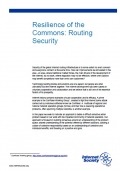Security of the global Internet routing infrastructure is to some extent no one’s concern and everyone’s concern at the same time. How can improvements be stimulated in this area – an area, where traditional market forces, the main drivers of the development of the Internet, do not work, where regulation may not be effective, where one’s actions may benefit competitors more than one’s own customers?
Technology building blocks and solutions are one aspect, but people are what ultimately hold the Internet together. The Internet development has been based on voluntary cooperation and collaboration and we believe that is still one of the essential factors of its prosperity.
Internet history contains examples of such cooperation and its efficacy. A prime example is the Conficker Working Group1, created to fight the Internet borne attack carried out by malicious software known as Conficker. A multitude of regional and national network operators groups (NOGs) and their role is resolving operational problems, often spanning multiple networks, is another example.
In this paper we seek to motivate an approach to tackle a difficult collective action problem based on our work with the impacted community of network operators. Our approach is focused on building consensus around an understanding of the problem space, shared understanding of the potential offered by different solutions, building a culture of collective responsibility based on an understanding of collective and individual benefits, and focusing on a positive end goal.
